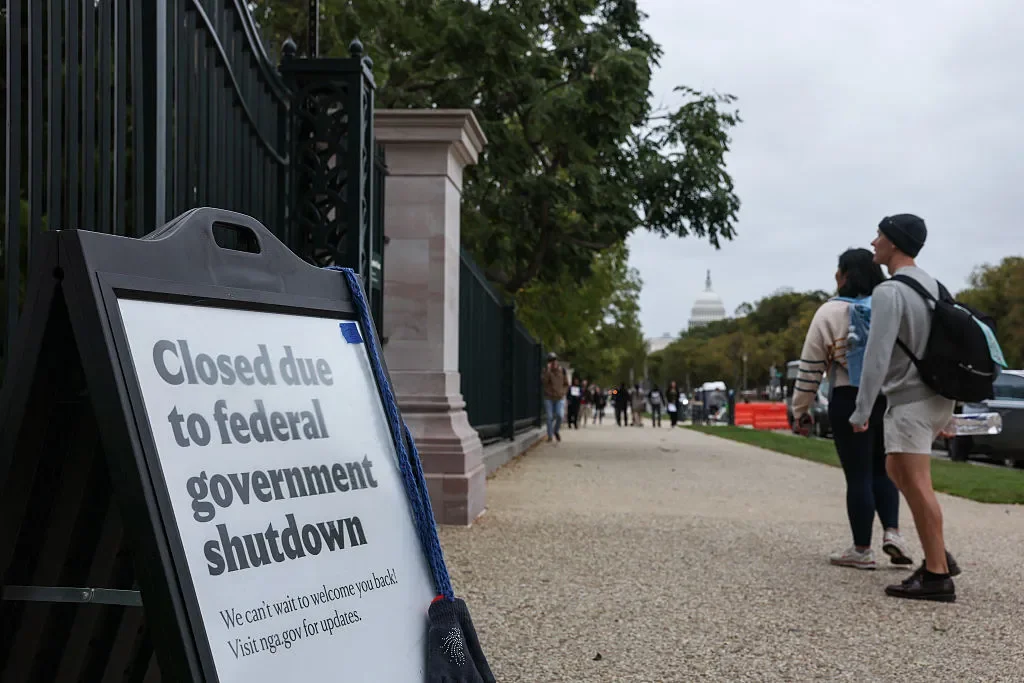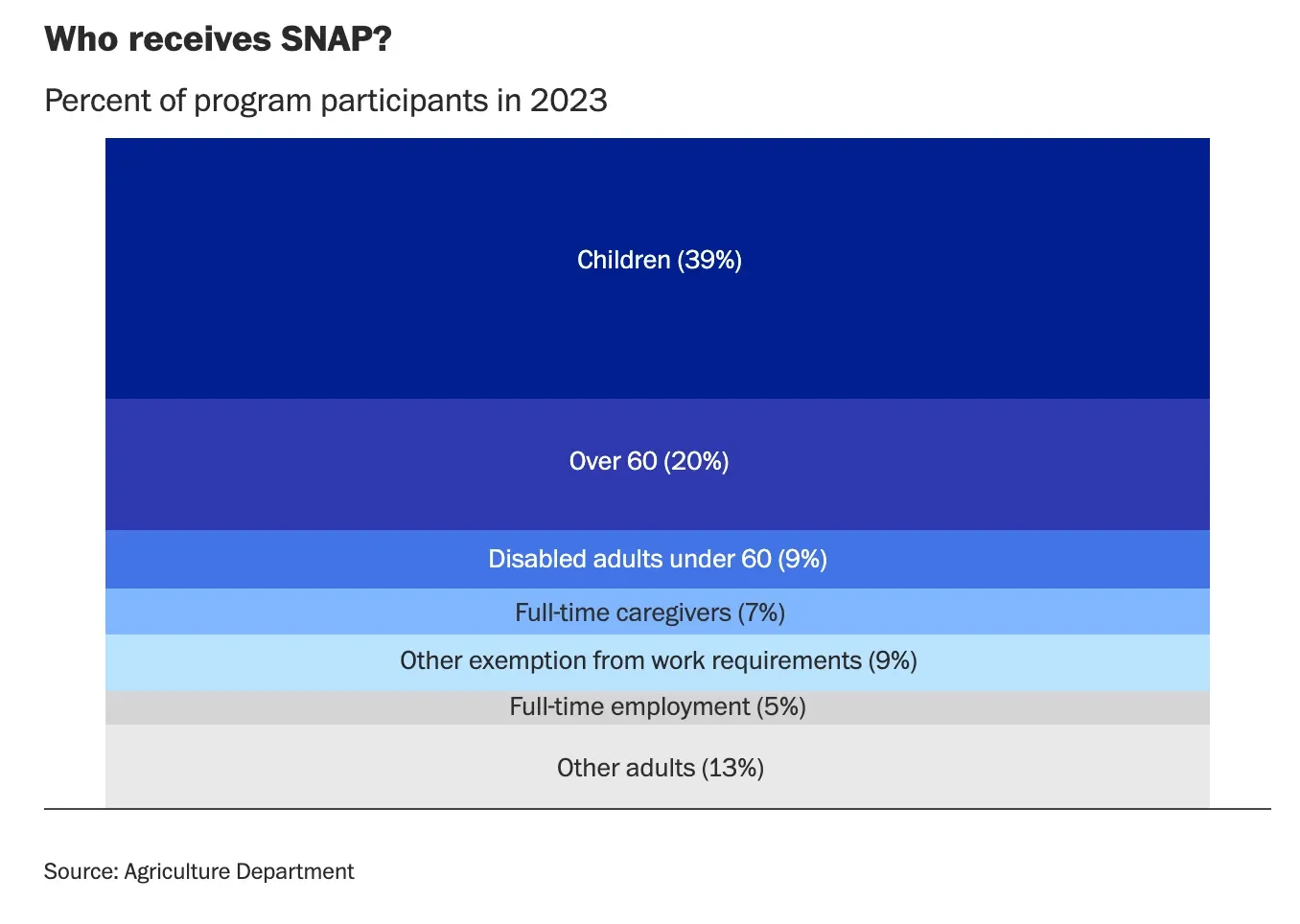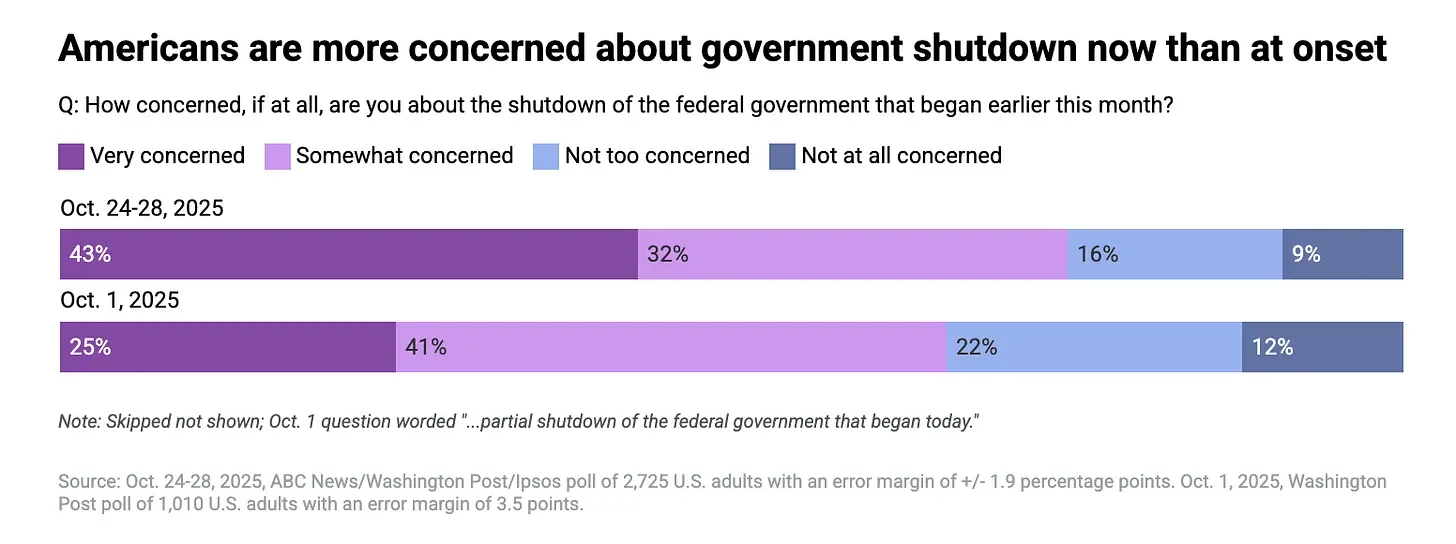Shutdown’s Make-Or-Break Moment: SNAP Funding, Healthcare Enrollment, & Upcoming Elections
Millions of Americans are set to feel the biggest impacts yet from Washington’s month-long government shutdown starting this weekend. In states across the U.S.:
Funding for the Supplemental Nutrition Assistance Program (SNAP) — the nation’s largest anti-hunger initiative, which helps about 41 million people — is set to lapse on Saturday
Open enrollment also begins this weekend for the Affordable Care Act (ACA), when about 22 million Americans could see their premiums skyrocket as pandemic-era subsidies expire. That’s the issue at the center of the shutdown standoff.
Democrats are refusing to reopen the government without extending those ACA subsidies. Republicans continue to insist the government must reopen first, then negotiate.
With two of the most fundamental needs — food and health care — on the line for millions of Americans, the stakes could not be higher, and lawmakers on both sides of the aisle are feeling the pressure from their constituents. But, right now there’s no end in sight, and the shutdown is quickly steamrolling toward becoming the longest in U.S. history.
THE SNAP DEBATE
Saturday will mark the first time in SNAP’s history that benefits aren’t issued. On average, SNAP recipients receive $187 per month — roughly $6 a day — to buy groceries. The program costs around $8 billion per month, serving about 1 in 8 Americans.
The Trump administration has said the congressionally-approved contingency funding for SNAP benefits is meant to be used in emergencies, like natural disasters, and not during a shutdown. The contingency funds amount to around $5 billion — which would not cover the full benefits for the entire month of November.
The Courts: Democrats sued the government, arguing the White House has a legal and moral duty to provide whatever money they have available. Two federal judges ruled Friday that the program must be funded using at least the contingency funds – and asked for an update on progress from the administration by Monday.
It’s not clear how long it would take to refill recipient’s debit cards; many could go weeks without money for food. “It is hard for me to understand how this is not an emergency,” District Court Judge Indira Talwani said during Thursday’s hearing in Boston.
GOP Debate: “We [have] got to find some way to get help to 40 million people. This Saturday is going to be bad,” said Sen. Josh Hawley (R-MO), who introduced the Keep SNAP Funded Act to keep benefits flowing.
Hawley’s bill already has 14 Republican co-sponsors. But Senate Majority Leader John Thune (R-SD) poured cold water on the measure Thursday, saying, “I think the vote needs to be on opening the government.”
Meanwhile, food banks across the country are bracing for a surge in demand just before Thanksgiving — on top of already record need.
PREMIUMS SET TO SPIKE
Saturday also marks the start of ACA open enrollment, and millions could see annual premium costs double if pandemic-era subsidies expire.
Roughly 22 million of the 24 million ACA enrollees receive enhanced tax credits. Without them, premiums could jump from $888 this year to $1,904 in 2026, according to KFF.
About 4 million people are expected to lose coverage entirely if the subsidies aren’t extended, the Congressional Budget Office estimates. If extended, it will cost the government about $35 billion per year.
Democrats are launching a blitz of town halls, ad campaigns, and canvassing events, hammering Republicans over potential premium spikes. It comes as several closely watched races will unfold next Tuesday, such as the governor’s races in Virginia and New Jersey. The results could signal to Dems whether their messaging is working or not.
“It’s going to be a punch in the face on November 1st when they see what they’re going to have to pay for their health care next year. And it’s unaffordable,” Sen. Mark Kelly (D-AZ) told Mo News Thursday.
THE POLITICS OF IT
Don’t expect a deal this weekend. The Senate has adjourned until Monday, and House Speaker Mike Johnson has kept the chamber out of session for more than 40 days — the longest unscheduled recess in modern history outside of summer or campaign season.
President Trump’s latest idea to end the stalemate is what he called the “NUCLEAR OPTION”: ending the Senate filibuster 60-vote majority rule, and allowing them to vote to reopen government with just a simple majority. Thune and other Senate GOP leadership have previously rejected the idea, given the precedent that could set.
A new ABC/Washington Post poll finds Democrats still hold the upper hand politically: 45% of Americans blame Trump and congressional Republicans for the shutdown, compared to 33% who blame Democrats. Among independents, the margin is even wider — 2-to-1 blaming the GOP.
Even more pressure: Millions of federal workers are still working without pay. While airports have so far withstood most of the strain, officials warn that unpaid TSA agents and other staff are growing weary, and Americans could soon feel the shutdown’s impact beyond their wallets.




